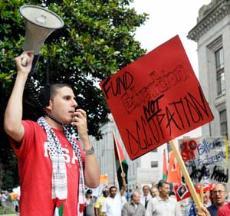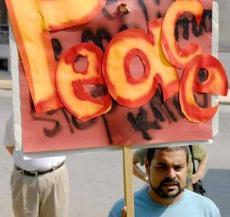More than 100 people gathered at the state Capitol Friday afternoon to protest what Hamdy Radwan, head of Muslim American Society’s Raleigh chapter, is calling “Israeli aggression.”
“Regardless of the ethnic background or religion, anyone who is killed, tortured or prevented from getting water — we should care about them,” he said, regarding his decision to organize the rally.
Tensions between Israel and the Palestinian Authority have become even more strained since the kidnapping of an Israeli soldier by Palestinian militants in late June. The Israel Defense Force responded by targeting militants in the Gaza Strip. Their efforts are ongoing.
Protesters raised colorful signs with slogans, such as “No Justice, No Peace,” passionately in the air as various individuals led chants repeated by those in attendance.
“Free, free Palestine!”
“Hey, hey, ho, ho, the occupation has to go!”
“What do we want? Justice! When do we want it? Now!”
For Shadi Sadi, a recent graduate in business management and member of N.C. State’s chapter of the Muslim Students Association, the occupation in Gaza has hit very close to home.
“My entire family lives in the West Bank,” he said. “I [have] a cousin — when he was seven — he got shot in the head [with a rubber bullet.] He was one of two twins and now he’s deformed. He doesn’t even look like his twin.”
Sadi said he is “baffled at how little Americans care,” adding that he thinks “Palestine is getting wiped off the map.”
“The whole world is complaining but we are still saying we won’t want to say anything,” he said. “Last week, the [White House] press secretary said [he declined] to condemn anything Israel is doing.”
According to Radwan, “things are really getting out of hand.”
“We need to do something about it to express our opinion,” he said.
Sadi said he chose to protest because of the “humanitarian standpoint.”
“It’s pathetic — the conditions they are living in,” he said, citing recent news of power and water being shut off in the areas at hand.
He said students should be concerned because the United States could one day become heavily involved and is already in other military conflicts overseas.
“Do you think if we went into one more war we wouldn’t have a draft?” he said. “That’s going to affect the students. We’ll be the first to be called.”
Radwan mentioned similar concerns.
“The U.S. foreign policy affects us right here in our homes,” he said. “When the U.S. practices a just and good policy, we feel it right here, and when the opposite happens, we still feel it right here.”
He said a “free mind” is very important when deciding a stance on this matter.
“Think about what is going on — fairly,” he said. “Sometimes we are preoccupied by our beliefs or our system of administration.”









